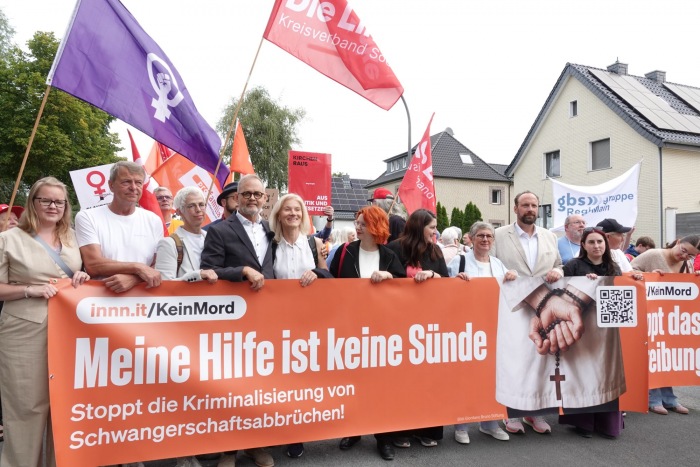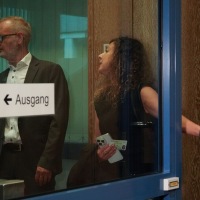Will Section 218 of the German Criminal Code Fall After All?
The resistance of gynecologist Prof. Joachim Volz sets many things in motion

demo_volz_ef_1.jpg
In Lippstadt, 2000 people demonstrated with Prof. Dr. Joachim Volz against the Catholic abortion ban (Photo: Evelin Frerk)
After the end of the "traffic light coalition" and the narrowly failed attempt in parliament to decriminalize abortion, there was great disillusionment in the ranks of pro-choice activists. But then the "Joachim Volz" case emerged, which brought new momentum to a debate that had already been written off. Suddenly, much seems possible again.
The head of the Lippstadt women's clinic, Prof. Dr. Joachim Volz, cannot and will not accept that his hospital operator (which recently merged with a Catholic sponsor) forbids him from continuing to perform medically indicated abortions (in cases of severe fetal damage or danger to the woman's health). Mediated by the physician Kristina Hänel, who was supported by the Giordano Bruno Foundation (gbs) in her proceedings under the (since repealed) Section 219a of the German Criminal Code, Joachim Volz came into contact with the gbs and its "legal task force," the "Institute for Secular Law" (ifw). ifw advisory board member Till Müller-Heidelberg took over the legal representation. A short time later, on June 2, 2025, the gbs went public with a first press release about the legal dispute.
The case generated a great media response. The online petition against the Catholic ban on abortion, which Joachim Volz launched in mid-July, was signed by more than 200,000 people in the first two weeks. The demonstration on the court date of August 8 even made it into "Tagesschau" and "heute Journal". The fact that the court in Lippstadt dismissed the doctor's lawsuit further increased the outrage over the presumptions of the Catholic Church. Thus, "ZEIT" (usually exceedingly church-friendly) published an article with the title "Wenn Frauenrechte weniger zählen als religiöse Dogmen: Das Verbot von Schwangerschaftsabbrüchen in Lippstadt macht fassungslos" [When women's rights count less than religious dogmas: The ban on abortions in Lippstadt is staggering]. The more than 450 comments on the text illustrate the mood within the population, which apparently can no longer comprehend why the Church still holds so much power in the 21st century.
Shortly after the verdict was announced, it became clear that the dismissal of the lawsuit was a "Pyrrhic victory" for the Church, which will harm rather than benefit it in the long run. For Joachim Volz and his supporters, on the other hand, it was a "successful defeat" that will further increase the pressure on politicians (a parallel to the case of Kristina Hänel, who kept losing in court until Section 219a of the German Criminal Code was finally abolished).
Photo gallery of the demonstration (Photos: Evelin Frerk)
What is special about the "Volz case" is that it calls many supposed "givens" into question. From a labor law perspective, it would be necessary to discuss, for example, whether religious dogmas may determine medical practice at all, and with regard to the welfare state, whether Catholics should be allowed to operate hospitals with public funds if they do not want to guarantee comprehensive medical care. Regarding Section 218 of the German Criminal Code, it would have to be clarified whether there is actually a significant difference between the allegedly "unlawful" abortion after counseling and the "legally compliant" medical abortion, when, as Volz explains, the same basic rule applies in both cases: "The doctor advises, the woman decides". Finally, it would also be necessary to examine that ominous notion that leads to massive restrictions in reproductive medicine in Germany (and also determined the unfortunate debate about the Federal Constitutional Court candidate Frauke Brosius-Gersdorf), namely whether it is really sensible to assume that fertilized eggs, blastocysts, embryos, and fetuses are "persons with human dignity".
As the head of a "fertility clinic", Joachim Volz knows only too well that these "products of conception" often do not lead to live births (according to conservative estimates, around 70 percent of them are aborted naturally). If they were indeed "bearers of fundamental rights", as the Catholic Church claims, Germany would have to mourn the "death" of 1.6 million (unborn) citizens per year, which corresponds to roughly the population of Munich (see the gbs sharepic series on this: "Willkommen im Uterus-Wunderland" [Welcome to Uterus Wonderland]).
Whether such evidence-based arguments can persuade the current federal government to rethink is uncertain. However, it is certain that the "Volz case" has already set much in motion. The debate about Section 218 of the German Criminal Code is open again…










